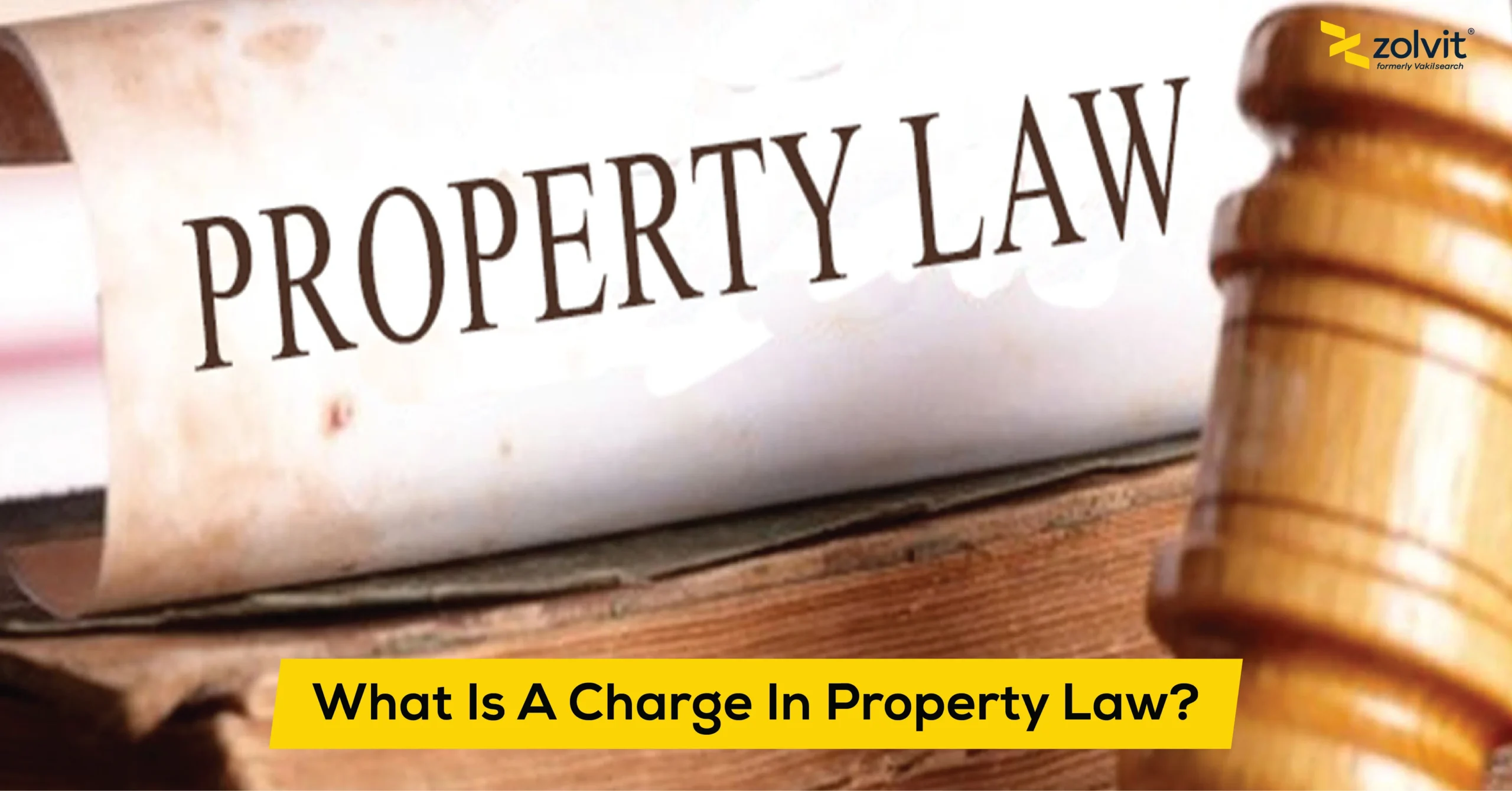Charges are an important aspect in financial dealings, offering security to creditors while enabling borrowers to retain ownership and possession of the property. With the implementation of a charge, creditors enjoy the guarantee of a legal channel for them to retrieve their rights, making financial deals secure and enforceable. This makes charges an important pillar of modern property finance and debt management systems.
This blog explains what is charges in property law, importance of charges in property transactions, types of charges, examples, explaining their legal significance and impact on ownership and financing. It explains how charges secure debts, rights and obligations of charge holders, enforcement, and key differences between charges and mortgages. It also explains common legal issues, resolution of disputes, and the role of property lawyers in charge agreements.
Charge in Property Law – Definition
A charge is a claim or security interest created over a property to secure the payment of a debt or performance of an obligation. A charge, unlike a transfer of ownership, does not entitle the charge holder to title to the property. Rather, it gives the charge holder enforceable rights against the property that can be used in case of default by the borrower.
Importance of Charges in Property Transactions
Charges are a method of securing debt and reducing risk for lenders while enabling owners of property to tap financial resources without having to sell their property outright. They are critical in property financing to ensure rights, obligations, and enforcement procedures are clearly outlined. Here are the key points about the importance of a charge:
- A charge provides lenders with security, allowing them to recover the loan if the borrower defaults by selling the property
- The property owner retains full ownership while using the property as collateral for the loan
- Charges can be customized to suit various loan terms, including repayment schedules and interest rates
- If the borrower defaults, the charge holder can take legal action to sell the property and recover the debt
- Registering a charge ensures potential buyers are aware of any existing liens or debts on the property.
Ramesh, a businessman, requires ₹50 lakhs to expand his business. Rather than selling his office building, he borrows from a bank by permitting it to create a legal charge on the building. This scheme allows Ramesh to continue owning and using the building while the bank has a legal right over it as security for the loan. If Ramesh pays back the loan in time, the charge is cancelled, and he has complete rights over the property. But if he defaults, the bank can realize the charge by selling the property to recover the loan. This illustration shows how charges allow borrowers to borrow money without losing ownership and safeguard lenders by securing their financial interests.
Types of Charges in Property Law
In property law charges are applied in order to secure debts or loans against property. Various kinds of charges are available, each having different levels of control and rights for the lender. There is a detailed description of the same given below:
- Legal Charge
A legal charge gives the charge holder enforceable rights known to law so that they can take direct action in law to recover debt by selling the property.
- Equitable Charge
As opposed to a legal charge, an equitable charge is created where there is a promise to utilise property as security but without adhering to all legal formalities. Enforceable, it calls for court action to enforce.
- Fixed Charge
A fixed charge is placed on certain assets, e.g., land or buildings, preventing the owner of the property from selling or modifying the asset without the permission of the charger holder.
- Floating Charge
A floating charge secures a pool of assets that may vary from time-to-time, like inventory or receivables. In case of default, the floating charge crystallizes and becomes a fixed charge.
- Specific Charge
This charge is attached to a specific asset, like a specific piece of land or a building, to provide accurate security.
- General Charge
A general charge is attached to all the assets of the debtor, providing complete security to lenders.
Legal Framework of Charges
Legal framework of charges regulates the formation, enforcement, and rights pertaining to charges on property. Following is a comprehensive framework of the same:
According to the Indian law of property, a ‘charge’ refers to an agreement where immovable property serves as security for debt repayment but without transferring the property to the creditor.
Section 100 of the Transfer of Property Act, 1882 states:
- When immovable property is used as security for the payment of money to another, but the transaction isn’t a mortgage, the creditor has a charge on the property.
- Provisions that apply to a simple mortgage also apply to a charge.
Exceptions:
- A trustee’s charge on trust-property for trust-related expenses.
- A charge against property in the hands of a person who received it for consideration without notice of the charge.
Impact of Charges on Property Rights
The impact of charges on property rights involves limiting the property owner’s ability to fully dispose of or transfer the property until the debt is repaid. Here is a detailed outline of the same:
1. Effect on Property Ownership
Charges limit the owner’s ability to freely transfer or modify the property without the charger holder’s consent.
2. Impact on Property Transfer and Sale
A property with a charge can only be sold if the buyer agrees to take on the charge or if it is cleared beforehand.
3. Risk of Property Loss Due to Default
Failure to meet obligations under the charge can result in foreclosure, leading to loss of ownership.
4. Legal and Administrative Implications for Owners
Property owners with a charge must navigate additional legal and administrative responsibilities. This includes maintaining regular payments, adhering to the terms of the charge, and managing legal formalities like registration or updates related to the charge.
Charges vs. Mortgages
Charges and mortgages both involve using property as security for a debt, but they differ in their legal implications. While a mortgage transfers some ownership rights to the lender, a charge allows the borrower to retain ownership, with the creditor holding a claim on the property until the debt is settled. Here is a complete comparative outline of the same:
Differences Between Charges and Mortgages
| Aspect | Charge | Mortgage |
| Definition | Defined under Section 100 of the Transfer of Property Act. | Defined under Section 58 of the Transfer of Property Act. |
| Nature of Interest | Interest is made in the property to pay off the loan, with no transfer of ownership. | Involves the transfer of ownership interest in immovable property. |
| Creation | Created either by the act of the parties or by the operation of law. | Created by the act of the parties only. |
| Registration | Registration is mandatory only when made by the act of the parties. | Registration is mandatory under the Transfer of Property Act. |
| Duration | Time is infinite and can continue indefinitely. | Time is fixed in a mortgage. |
| Enforceability | Right in personam (enforceable against a person). | Right in rem (enforceable against the world at large). |
When to Use a Charge Instead of a Mortgage
- A charge is ideal when the borrower wants to retain full ownership while securing a secured interest, such as in business loans or financial obligations.
- Mortgages are better suited for property-secured transactions requiring long-term repayment structures, like home financing.
Role of Property Lawyers in Charge Agreements
Property lawyers play a crucial role in charge agreements by ensuring that the legal framework is properly followed and that both parties’ interests are protected. They assist in drafting, reviewing, and enforcing charge agreements, ensuring compliance with relevant laws. Here is a list of tasks performed by the same:
- Legal Advice and Guidance
Property lawyers assist both lenders and borrowers in understanding the terms and implications of charges. They offer expert property legal guidance, ensuring all parties are aware of their rights, obligations, and potential risks. This helps in making informed decisions about securing debt or obligations through charges. - Drafting and Reviewing Charge Agreements
Lawyers are responsible for drafting and reviewing charge agreements, ensuring that they are legally sound and protecting the interests of both the chargeholder and the property owner. This step ensures contractual clarity in charges, making sure all terms are clearly defined and enforceable. - Dispute Resolution and Enforcement
When conflicts arise regarding the validity or enforcement of a charge, property lawyers provide property law representation. They act as advocates in both mediation and litigation to resolve disputes, ensuring that the rights of their clients are protected in court if necessary.
Common Issues with Property Charges
Common issues with property charges include disputes over the validity of the charge, unclear terms in the agreement. Here is a detailed outline of the same:
- Disputes Over Charge Validity: Conflicts may arise over whether a charge was created legally or if proper formalities were followed, requiring the charge holder to prove compliance with legal requirements.
- Breach of Contract in Charge Agreements: Disagreements over repayment terms or enforcement can lead to legal battles, with enforcement needed to ensure contract compliance.
- Issues with Overvalued Assets: Overvalued assets may result in creditors being unable to recover full dues in case of default, creating risks for property charge liabilities.
- Priority of Charges: Conflicts may occur when multiple charges are placed on the same property, requiring legal action to determine which charge holder has enforcement priority.
- Ambiguity in Charge Documentation: Poorly drafted or vague terms in charge agreements can lead to misunderstandings and disputes, highlighting the importance of clear documentation.
Conclusion
Charges in property law are indispensable tools for securing financial obligations and ensuring legal certainty in property transactions. By understanding the types, legal framework, and impact of charges, stakeholders can navigate property financing effectively while safeguarding their rights. Legal advice is crucial in drafting and enforcing charge agreements, resolving disputes, and maintaining the delicate balance between creditors and property owners.
- Charges in property law are vital for securing financial obligations, providing creditors with a form of collateral to minimize risk.
- Different types of charges, such as fixed and floating charges, offer distinct ways to protect the interests of lenders and ensure property is used as a security for loans.
- Section 100 of Trademark Act of 1882 governing charges ensures that property transactions are clear and enforceable, offering certainty and clarity for both creditors and property owners.
- Charges help maintain a balance between creditors and property owners, ensuring that both parties’ rights are protected and disputes are minimized in property financing agreements.
- Professional legal advice is crucial when creating and enforcing charge agreements to ensure they are legally binding and protect the interests of all parties involved.
FAQs Related To CHARGE IN PROPERTY LAW
Which of the following is not a property of a charge?
Ownership transfer is not a property of a charge. A charge only creates a security interest over the property without transferring ownership to the charge holder.
Can a property owner sell a property with a charge on it?
Yes, but the sale can only proceed if the charge is cleared (repayment is made) or the buyer agrees to assume the charge. Without addressing the charge, the sale cannot be legally completed.
Can a charge be removed from my property?
Yes, a charge can be removed once the associated debt or obligation is fully repaid. The property owner must then file the necessary documents with the registering authority to release the charge.
How does a charge affect my property title?
A charge encumbers the property, meaning the title is subject to the rights of the charge holder. This restricts the owner's ability to sell, transfer, or modify the property without the charger holder's consent.
What is a “charge holder” in property law?
A charge holder is the lender or creditor who holds the legal right to enforce the charge on the property in case of default.
How can I avoid getting into a charge dispute?
To avoid disputes, ensure the charge agreement is clear, properly documented, and legally registered. Always comply with repayment terms and maintain open communication with the charge holder.
What is an example of a charge in property law?
A classic example is a bank loan secured by a charge on a house. If the borrower defaults, the bank can enforce the charge by repossessing and selling the property to recover the loan amount.





